Reply To:
Name - Reply Comment
No cricketer has courted controversy as much as Muttiah Muralidaran did during his international playing career. To many he was a genius but for some he was a ‘cheat’.
The International Cricket Council (ICC) recently inducted Muttiah Muralitharan, the greatest off-spinner of all time to the ICC Hall of Fame for his contribution for cricket.
Murali ended his international career as the highest wicket taker in Tests (800) and ODI (534) ending a near-two decade of dominance with the ball.
Mirror Cricket spoke to Murali , Ana Punchihewa who was the SLC President when Murali's chucking controversy occurred. Current SLC President Thilanga Sumathipala , Asanka Gurusinghe, a team mate of Murali, and Ranjit Fernando who was the team manager in 1995 tour to Australia.
Watch the Video
INCOMPARABLE Legendary spinner Muttiah Muralitharan speaks of past, present and future
Read the Exclusive Interview
 While questions about him will always remain and opinions always be split, few players have endured and overcome what Muttiah Muralitharan did during his 20 year cricketing career. His dysfunctional action coupled with unique dexterity at every juncture of his arm – a result of a kink in design – was perhaps one of modern cricket’s biggest controversies, but it also helped him end his career as one of cricket’s greatest bowlers with an unfathomable 800 Test and 534 One Day International wickets. It also saw him being inducted into the ICC Hall of Fame this year, an honour which a Sri Lankan had not yet enjoyed. In an exclusive interview with the , Muralitharan discusses his induction, his eternal gratitude to former captain Arjuna Ranatunga, and why fitness is not the most important factor for a cricketer.
While questions about him will always remain and opinions always be split, few players have endured and overcome what Muttiah Muralitharan did during his 20 year cricketing career. His dysfunctional action coupled with unique dexterity at every juncture of his arm – a result of a kink in design – was perhaps one of modern cricket’s biggest controversies, but it also helped him end his career as one of cricket’s greatest bowlers with an unfathomable 800 Test and 534 One Day International wickets. It also saw him being inducted into the ICC Hall of Fame this year, an honour which a Sri Lankan had not yet enjoyed. In an exclusive interview with the , Muralitharan discusses his induction, his eternal gratitude to former captain Arjuna Ranatunga, and why fitness is not the most important factor for a cricketer.
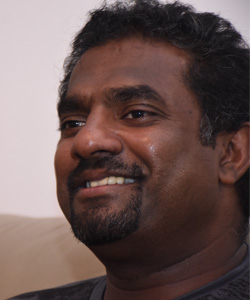 Q: What does it mean for you to be inducted into the ICC Hall of Fame, considering the other achievements in your career?
Q: What does it mean for you to be inducted into the ICC Hall of Fame, considering the other achievements in your career?
I am honoured, because it’s recognition (from the ICC) and I am the first Sri Lankan to get it. I think it’s an honour for anyone to be recognised from the governing body. I went through so many controversies, and so many things have happened.
Q: Were you surprised that you were the first Sri Lankan to receive this accolade?
In a way, yes, but in the future there will be many more because there are some great players who have played for Sri Lanka.
Q: And a special occasion too - against India at the Oval and one of Sri Lanka’s greatest ODI run chases.
Definitely. The Oval is a memorable ground, because that’s where I got 16 wickets and where for the first time we won (a Test) against England. Only after that we started getting three test match series. I’ve played so many matches and I got a lot of wickets there, so it’s a memorable place. They asked me whether I wanted to receive it there, and I said ‘of course, why not?’ The sweet part of it was that India had a very strong side and still we beat them.
Q: There were some suggestions that you turned down the opportunity to receive the accolade in Sri Lanka.
I didn’t turn it down as such, but the problem was that I was never in Sri Lanka. I was at the IPL (among other commitments) – whenever they called I was abroad. Ashley (de Silva, Sri Lanka Cricket CEO) called a few times and I said I was not in the country. ICC asked me if I wanted to get the award at the Oval, and so I did.
Q: Your career was riddled with controversy. Some people called you a genius, while others labelled you a cheat. Do you see this induction as a validation of the fact that you were a legitimate spin bowler?
I have been a legitimate spin bowler, since I have done all the tests. You can’t satisfy everyone. Some people always have their reservations on that. The majority, I believe, accepted me as what I am, and I have done all the tests and I’ve proved myself. I can’t prove for everyone, and you can’t satisfy everyone. So be it.
I don’t have to prove anything anymore. It has happened. The records will remain, the memories will remain.
Q: Earlier this year you said that Sri Lankan players are not good enough to play in leagues like the IPL. What is it that Sri Lankans lack to play in those big T20 leagues?
I never said (they weren’t) good enough. At that moment nobody had performed – not many at least. There are Sri Lankan players who can play IPL. (But) The IPL is very different from playing in a (domestic tournament), because you get four international players per match day and you get the best of the best in the world. If you think ‘best of best’, (there aren’t) many people here. They’re all young cricketers, (who need to) prove themselves to earn that spot.
There are a few Sri Lankans – Thisara (Perera) has played, (Lasith) Malinga has kept on playing, Angelo (Mathews) has kept on playing – but others could not make it. Asela (Gunaratne) also got an opportunity but he didn’t get to play. The opportunities are not there for them at the moment, until they show (what they are capable of) with the national team, then only they will get (those opportunities). The IPL is all about entertainment and cricket, and every owner wants to win. He wants to pick the best players.
They are not (interested in) future players. Those opportunities go to Indian players. When we started playing IPL we had about 18 players. For the last couple of years our cricket has gone down because people retired. So they (the current players) have to prove themselves.
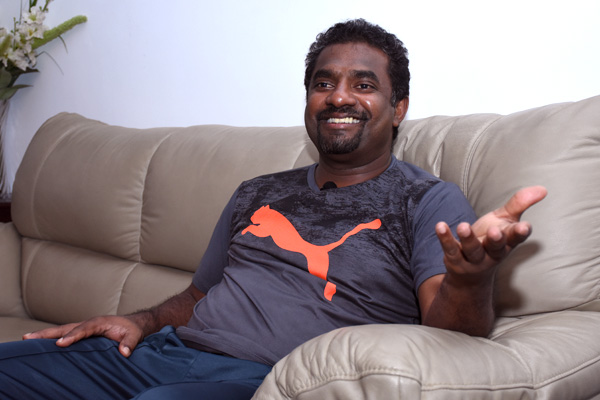
Q: Going back to the whole chucking controversy, in 1995 and 1999, you had the support of a really good captain and the board and the players. How important were those individuals in protecting you at that time, and do you think your career would have panned out differently if not for those individuals?
All things said and done, I think Arjuna (Ranatunga) was the main guy. No captain would have come so far and defended a player. He was a great captain and he thought (that) I was not doing anything wrong and thought I was going to be a great asset to Sri Lanka cricket. So he thought that, that was the way to fight.
He fought the battle alone many times. And when he fought then the board had to support him. Arjuna was a very popular figure and a good captain and has done a lot for this country. Then the public, they supported. It was a collective effort but I give most of the credit to Arjuna.
It’s diffcult to say (if things might have panned out differently). Cricket path, maybe. Maybe in other paths I would have been a success. Life is all about choices, there would have been other choices, so I would have picked something different.
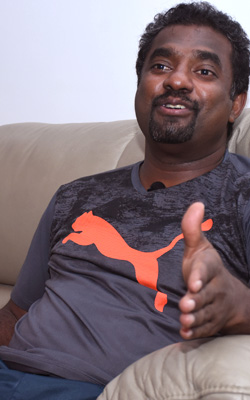 Q: So you consider Arjuna as the best captain you’ve played under?
Q: So you consider Arjuna as the best captain you’ve played under?
Of course. To me he is the best captain, no doubt about it.
Q: There are a few records that are likely never to be broken, in our lifetimes at least, and your record of 800 Test wickets is probably one of them. Looking back is there any one of those 800 dismissals that you cherish and remember the most?
Every wicket is priceless to me, because I didn’t take wickets to break records; I took those wickets to help Sri Lanka win. The most important thing is winning. How many wickets you take doesn’t matter as long as you win a championship or win for Sri Lanka. It’s a team game so that’s the most important thing. The records and the individual achievements will come along and build up, but the main objective is to win. I will cherish, more than any wicket, the 1996 World Cup.
Q: Do you agree with the notion that the modern game, with its rule changes, are hard on bowlers especially for spin bowlers?
You can’t say it’s unfair. Always there have been rule changes in favour of the batsmen, but the bowlers will adapt. Better bowlers come about and (they) adapt. It’s a battle between the ball and the bat, so sometimes you feel disadvantaged (as a bowler), sometimes you get a spinning wicket and the batsman can’t do anything. It’s a 50-50 game.
Q: Last year you were embroiled in controversy when you chose to coach the Australian team against Sri Lanka. Looking back at the backlash, do you regret that decision now? Or would you do it again, if the opportunity presented itself?
Definitely I would do it again. It is all about professionalism. If Sri Lanka Cricket doesn’t want us, there are other opportunities. If you don’t have an opportunity in your own country, you have to create your opportunity. There are a lot (of former Sri Lankan players) coaching outside. (Chandika) Hathurusinghe is one of the most successful coaches; Mahela Jayawardene won the IPL -- that means we have the talent. I think the opportunity is not available in Sri Lanka so they must want to go abroad.
Q: This year is 21 years since Sri Lanka won the Cricket World Cup. What relationship do you have with the people in that squad?
I’m still friendly with everyone. We meet often. Recently also all of us went to Australia (for a benefit match for past cricketers). But it’s not all about this year being 21 years since we won the World Cup -- (the question is) when are we going to win the next one? We can’t be happy about it; 21 years ago we won the World Cup we haven’t won it yet. That is a sad part. I would say, the question is, how are we going to win the World Cup next time?
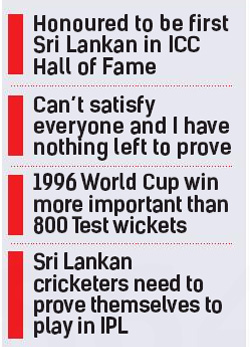 Q: What was it about that team that made it so special?
Q: What was it about that team that made it so special?
The experience. We had about four or five very good experienced players. Arjuna, Aravinda (de Silva), Roshan (Mahanama), Hashan (Tillakaratne) and then we had very talented young players, they were all great cricketers.
That mix is important. Then the calm and cool captaincy (is required) – how to handle things and he (Arjuna) just fought for the players. There was no interruption from the cricket board – there was no cricket board at all. It was simple (at the time). It was more about the cricket, and they did the job. That’s important for a cricket team.
Q: What’s your opinion of the current Sri Lanka team and do you think that cricket board politics is hampering the development of the team?
There are some very talented cricketers, but nobody looks after them. Nobody supports them. They will lose matches; that’s part of the game. You win some, you lose some. How you lose is the most important thing. They played well in the Champions Trophy. The first match, against South Africa, we got a start but couldn’t capitalise on that. The second game we won, and the third match, we narrowly lost. So I think it was a good tour. We ended up with not qualifying, but still it was good enough.
I think the talent is there, but the only thing is criticism – how you criticise. It’s easier (and better) to have positive criticism, not negative criticism and not put cricketers down. Once you put cricketers down they are scared, they are nervous to go and play again. (When you) Openly criticise, you’re playing to the media. That’s politics.
As a Sri Lankan cricket fan and past player I would like to encourage them, rather than demoralise them. In that scenario (where players are demoralised because of criticism) you’ll be going into the next match scared of dropping a catch. Everyone drops a catch. Doesn’t mean they are bad fielders.
When we played, any distraction from the cricket board we dealt with it in a different way. We got together, spoke to them and left it. It never went out to the media, and we never clashed in the media. (Now) Officials put rules and regulations, saying players can’t do anything (because of) a code of conduct. Same way, the officials also should have a code of conduct, so they are not inappropriately mentioning about players. They also need to adhere to certain rules.
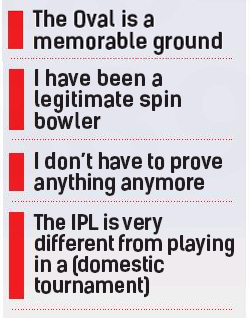 I think officials should keep their mouths shut most of the times, because they don’t understand (the game). If a player has a technical problem, you go to a coach and ask whether that cricketer has done justice for his performance. If he has not, drop him. You don’t have to insult people. You can go to them, and talk to them. Tell them that these are the improvements needed, and put criteria that are relevant to cricket.
I think officials should keep their mouths shut most of the times, because they don’t understand (the game). If a player has a technical problem, you go to a coach and ask whether that cricketer has done justice for his performance. If he has not, drop him. You don’t have to insult people. You can go to them, and talk to them. Tell them that these are the improvements needed, and put criteria that are relevant to cricket.
I’ve been hearing these comments about fat levels needing to be a certain amount. Physical fitness is one aspect of cricket. It’s not all about fitness. You have to be intelligent, skilful and talented. If you are not talented you won’t come into the A team or the national team. These are gifted players. It doesn’t mean that those gifted players, just because their fat levels are high, are bad cricketers. Without knowing, people should not open their mouths. It’s not right.
Some people who talk also never played cricket and never understand what happens in the middle. Allow the players to play their way. Coaches, trainers and physios are there to look after them. You can’t create unnecessary criteria that only three people can match; where are we going to find eleven players? (Playing) Cricket is a talent and the cricketers should be told how to better their performance, how to increase their performance, how to mentally get stronger. If you don’t demoralise the players you will automatically see this team going forward. If you had these fitness and fat level (requirements) when I played, Aravinda would never have played. Arjuna would have never played.
Q: So there is too much emphasis on fitness then?
I think too much emphasis on fitness is not going to do anything. It’ll only ruin the cricketing fraternity in our country. One of the aspects is fitness, but there are more aspects to it.
Q: Except for Rangana Herath, Sri Lanka has lacked a quality wicket taking spin bowler, and there seems to be a dearth in quality at the moment. What do you make of the current situation, and do you think they are in safe hands?
I think they are in safe hands, because Piyal Wijetunga is a very good coach. I used to go and work with him also. I don’t know what happened with (Ajantha) Mendis, because after I left he was still playing, but maybe how they managed him (he fell off the radar). Then they spoke about Suraj Randiv a lot, Sachithra Senanayake, and now they have Jeffrey Vandersay – there are a lot of spinners there. Dilruwan is still doing well. The spinners are there. It’s all about managing and giving people opportunities and believing in them.
Maybe the management doesn’t believe in them – bowlers like Randiv and Senanayake. They are the experienced bowlers now, and I don’t know why they are not playing. Maybe the selectors ran out of confidence in these players, and once that happened they were looking for new bowlers. You can’t expect new bowlers to do miracles as soon as they come. It takes three or four years for them to get established.
Q: Your opinion of Rangana Herath? He’s a bowler who didn’t have much of a chance when you played but has blossomed into Sri Lanka’s best spin bowler.
No, he had the chances. He played with me. I took more wickets so his recognition didn’t come. When I left no other bowler took wickets, and Rangana started taking wickets, so the recognition came. Other bowlers overtook him, and then he came back.
He’s a great bowler, he’s taken more than 300 wickets. And he’s 40. He’ll at least reach 400 and then he’ll call it a day because he also can’t keep on going. We need to see some young bowlers coming in.
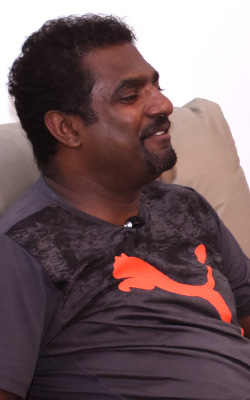 Q: Sri Lanka will have their 10th coach (interim or permanent) since 2011 when the next coach is appointed, following Graham Ford’s resignation. Does that surprise you?
Q: Sri Lanka will have their 10th coach (interim or permanent) since 2011 when the next coach is appointed, following Graham Ford’s resignation. Does that surprise you?
It’s very surprising, because if you’re having ten coaches over six years, it’s amazing.
In the 20 years that I played, between 1991 and 2011, we had only about seven coaches. I think it’s the way you treat the coach, and the performance of the coach and that varies depending on the coach and the cricket board. If you’re having that many coaches in five or six years there is either something wrong with the coaches or the administrators. You can’t go on like that. Because when a coach comes his methods are different to the previous coach, so cricketer’s can’t adapt to every coach and it takes about four or five months to connect with the coach.
If coaches are leaving, it’s absurd. No other country would employ coaches like this, there must be something fundamentally wrong. And it’s the same with the players, using 44 players in a year. It’s too many. It means you don’t have the faith in the players. These are the fundamental wrongs that need to be ironed out by the administration. (Have to) Give players a longer period, and give them a chance. Look at players like Sanath Jayasuriya and Marvan Atapattu – that’s the evidence of (the benefits of) giving longer stints to players.
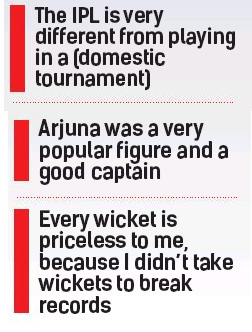 Q: You have been actively involved with the Foundation of Goodness, and especially with the Murali Cup. What impact have you seen the tournament make in the North and the East?
Q: You have been actively involved with the Foundation of Goodness, and especially with the Murali Cup. What impact have you seen the tournament make in the North and the East?
The Foundation of Goodness was started by Kushil (Gunasekera) and myself, and we’ve been doing a good job. We have recognized trustees in Mahela (Jayawardena), Sanga (Kumar Sangakkara), and Hashan. We try to help the community, and through Kushil we’ve done a lot of great work in the 17 years since we started the foundation, and we do it without any publicity. Sports is one aspect of the work we do, and there are several sports of which cricket is one.
We started the Murali Cup with the intention of improving the relationship between the South and the North, and to help the reconciliation. The best medium for that is sports, and cricket is the most popular sport in the country. We’ve been conducting the Murali Cup for the last five years, funded through various donors, and the main aim is to give opportunities and bring awareness through these public figures.
The aim of the Murali Cup is not to produce national cricketers – that’s not our job. Our job is to give them the foundation for them to enjoy themselves, regardless of ethnicity, to play together like brothers, enjoy themselves and not have those differences among the younger generations. Because with the older generations, that hatred will be there forever. The younger generation doesn’t understand that so we try and facilitate an opportunity for them to associate now, rather than when it’s too late.
Q: Is there still a lack of exposure for cricketers in the North and East?
When Nishantha (Ranatunga, former SLC President) was there, the Foundation supported about 60 cement wickets in the North and East and rural areas. It was funded by the Foundation, the Cricket Board and Tokyo Cement. You need a pitch to play, and Mahela personally gave cricketing goods for these kids, for the Under 13 and 15 schools. We helped at the grassroots level, but the Cricket Board should do more. I don’t know what the cricket board is doing now, but they need to think about helping these areas and develop their basic infrastructure – not to make stadiums.
We have enough of stadiums, and only a limited number of international matches every year. Schools need supplies – cricket nets, equipment – and the encouragement to play and then the talent will come because there are a lot of cricket playing schools in those areas. We are doing our small bit, but the government and the cricket board need to play a bigger role to help these areas.
PIC BY KUSHAN PATHIRAJA